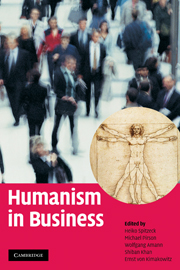Book contents
- Frontmatter
- Contents
- List of figures
- List of tables
- List of editors and contributors
- Acknowledgements
- Humanistic Management Network: paving the way towards a life-serving economy
- Introduction
- Part 1 Philosophic-historical grounding of humanism
- Part 2 Towards an integration of humanism and business on a systems level
- Part 3 Humanistic management
- 13 Democratizing the corporation
- 14 Social entrepreneurship: a blueprint for humane organizations?
- 15 Humanism at work: crucial organizational cultures and leadership principles
- 16 Positive organizational scholarship: embodying a humanistic perspective on business
- 17 Corporate sustainability as an indicator for more humanism in business? A view beyond the usual hype in Europe
- 18 Changing direction: corporations as ambassadors for the environment?
- Part 4 The individual as a change agent for a humane business society
- Index
- References
16 - Positive organizational scholarship: embodying a humanistic perspective on business
Published online by Cambridge University Press: 25 January 2011
- Frontmatter
- Contents
- List of figures
- List of tables
- List of editors and contributors
- Acknowledgements
- Humanistic Management Network: paving the way towards a life-serving economy
- Introduction
- Part 1 Philosophic-historical grounding of humanism
- Part 2 Towards an integration of humanism and business on a systems level
- Part 3 Humanistic management
- 13 Democratizing the corporation
- 14 Social entrepreneurship: a blueprint for humane organizations?
- 15 Humanism at work: crucial organizational cultures and leadership principles
- 16 Positive organizational scholarship: embodying a humanistic perspective on business
- 17 Corporate sustainability as an indicator for more humanism in business? A view beyond the usual hype in Europe
- 18 Changing direction: corporations as ambassadors for the environment?
- Part 4 The individual as a change agent for a humane business society
- Index
- References
Summary
“What a man can be, he must be”
(Maslow 1970: 46)Positive Organizational Scholarship (POS) is an umbrella label that includes theory and research concerned with the study of positive outcomes, processes, and attributes of both organizations and their members (Cameron, Dutton, and Quinn 2003; Roberts 2006). As such, POS embraces the study of topics such as gratitude, resilience, appreciative inquiry, energizing relationships, happiness, and others that involve the pursuit of human growth and self-development.
POS was initially based on the positive psychology movement. According to the proponents of positive psychology, instead of only accentuating the dysfunctional and negative aspects of human life, with a deficit framework in mind, researchers and practitioners alike should start to look more into identifying and nurturing people's strongest qualities, and focus on understanding those things that make life worth living (Seligman and Csikszentmihalyi 2000). Those who support POS are likewise committed to understanding how organizations and institutions can help individuals devise their best selves and delineate how they can best accomplish them (Roberts et al. 2005). This resembles the contributions of humanistic scholars such as Maslow, quoted above, in their emphasis on the need for the self-actualization of the human being, and attests to the humanistic roots of POS.
There is a clear continuity of POS with humanism. However, POS constitutes more than just another humanistic approach. It represents an accentuation of the humanistic values, strengthening both the humanistic claims and their impact on the business world.
- Type
- Chapter
- Information
- Humanism in Business , pp. 278 - 298Publisher: Cambridge University PressPrint publication year: 2009
References
- 3
- Cited by



